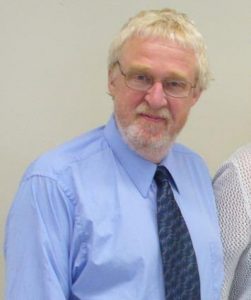Terry Blumenthal

Professor of Psychology
Greene Hall 112
(336) 758-5531
blumen@wfu.edu
My work involves using the startle reflex to look at central nervous system function. The startle reflex is an easy and noninvasive measure of CNS activity, and we assess this activity by measuring the electrical activity of the muscle that causes the eye to blink. This muscle activity is driven directly by a set of neurons in the brainstem and is affected by a number of different factors, such as stimulus parameters (physical properties of the stimulus, which sensory system is stimulated, interactions between sensory systems), subject parameters (extraversion, anxiety), and situation parameters (social encounter, directed attention). Two nice things about this startle reflex are: 1) the fact that we can easily measure CNS activity without breaking the skin, and 2) the fact that this reflex is so sensitive to a wide variety of factors. This makes the startle reflex a useful probe or measurement tool for those factors.
Recent projects include using the startle response and its modification by other stimuli to evaluate a variety of issues in several areas of psychology. These include looking at differences in automatic processing of stimuli during periods of directed attention versus relaxation; evaluating simple stimulus processing during anticipation of a social encounter, in people with either high or low trait anxiety; measuring fundamental information processing properties based on signal-to-noise ratio and stimulus intensity. We also collaborate with labs at other Universities, and these projects currently involve using startle responding as an assessment of information processing abilities in schizophrenia, and using startle modification to evaluate dopamine systems in newborn babies. Students work on a variety of projects with each other, and we often submit completed projects for presentation at national and international scientific meetings, as well as for publication.
Scholarly Interests
Physiological mechanisms that underlie behavior and information processing
- Faunce, J.A., Blumenthal, T.D., & Waugh C.E. (2022). Anxiety and initial value dependence in startle habituation. Psychophysiology, 59, e14071.
- Peterson, H.A., & Blumenthal, T. D. (2018). Efficacy of stimulus intensity increases and decreases as inhibitors of the acoustic startle response. Psychophysiology, 55, e13266.
- Melkonian, D., Blumenthal, T. D., & Barin, E. (2018). Quantum theory of mass potentials. PLOS One, 13(7), e0198929.
- Hengesch, X., Larra, M. F., Finke, J. B., Blumenthal, T. D., & Schächinger, H. (2017). Enhanced startle reflexivity during presentation of visual nurture cues in young adults who experienced parental divorce in early childhood. International Journal of Psychophysiology, 120, 78-85.
- Pineles, S. L., Blumenthal, T. D., Curreri, A. J., Nillini, Y. I., Putnam, K. M., Resick, P. A., Rasmusson, A. M., & Orr, S. P. (2016). Prepulse inhibition deficits in women with PTSD. Psychophysiology, 53, 1377-1385.
- Benke, C., Blumenthal, T. D., Modeß, C., & Hamm, A. O., & Pané-Farré, C. A. (2015). Effects of anxiety sensitivity and expectations on the modulation of the startle eyeblink response during a caffeine challenge. Psychopharmacology, 232, 3403-3416.
- Blumenthal, T. D., Reynolds, J. Z., & Spence, T. E. (2015). Support for the interruption and protection hypotheses of prepulse inhibition of startle: Evidence from a modified Attention Network Test. Psychophysiology, 52, 397-406.
- Blumenthal, T. D. (2015). Presidential Address 2014: The more-or-less interrupting effects of the startle response. Psychophysiology, 52, 1417-1431.
- Schilling, T., Kolsch, M., Larra, M. F., Zech, C. M., Blumenthal, T. D., & Schächinger , H. (2013). For whom the bell (curve) tolls: Cortisol rapidly affects memory retrieval by an inverted U-shaped does-response relationship. Psychoneuroendocrinology, 38, 1565-1572.
- Huggenberger, H. J., Suter, S. E., Blumenthal, T. D., & Schächinger , H. (2013). Maternal social stress modulates the development of prepulse inhibition of startle in infants. Developmental Cognitive Neuroscience, 3, 84-90.
- Mathias, C. W., Blumenthal, T. D., Dawes, M. A., Liguori, A., Richard, D. M., Bray, B., Tong, W., and Dougherty, D. M. (2011). Failure to sustain prepulse inhibition in adolescent marijuana users. Drug and Alcohol Dependence, 116, 110-116.
- Nees, F., Hahn, M., Schulz, A., Blumenthal, T. D., & Schaechinger, H. (2009). Associative conditioning of prepulses in a startle inhibition paradigm. Psychophysiology, 46, 481-486.
- Blumenthal, T. D., Cuthbert, B. N., Filion, D. L., Hackley, S. A., Lipp, O. V., & van Boxtel, A. (2005). Committee report: Guidelines for human startle eyeblink electromyographic studies. Psychophysiology, 42, 1-15.
- Flaten, M. A., Asli, O., & Blumenthal, T. D. (2003). Expectancies and placebo responses to caffeine-associated stimuli. Psychopharmacology, 169, 198-204.
- Blumenthal, T. D. (2001). Extraversion, attention, and startle response reactivity. Personality and Individual Differences,30, 495-503.
- Melkonian, D., Blumenthal, T. D., & Gordon, E. (1999). Numerical Fourier transform spectroscopy of EMG half-waves: Fragmentary-decomposition-based approach to nonstationary signal analysis. Biological Cybernetics, 81, 457-467.
- Blumenthal, T. D. (1999). Short lead interval modification. In Dawson, M. E., Schell, A. M., & Boehmelt, A. H.,Startle modification: Implications for neuroscience, cognitive science, and clinical science. (pp 51-71). Cambridge, UK: Cambridge University Press.
- Blumenthal, T. D., & Goode, C. T. (1991). The startle eyeblink response to low-intensity acoustic stimuli.Psychophysiology, 28, 296-306.
- Blumenthal, T. D., Avendano, A., & Berg, W. K. (1987).The startle response and auditory temporal summation in neonates. Journal of Experimental Child Psychology, 44, 64-79.
- Blumenthal, T. D., & Berg, W. K. (1986). The startle response as an indicator of temporal summation. Perception and Psychophysics, 40, 62-68.
- Neurological Disorders (First Year Seminar)
- The Drug Wars (First Year Seminar)
- Introductory Psychology
- History and Systems of Psychology
- Physiological Psychology
- Psychopharmacology
- Research Methods
